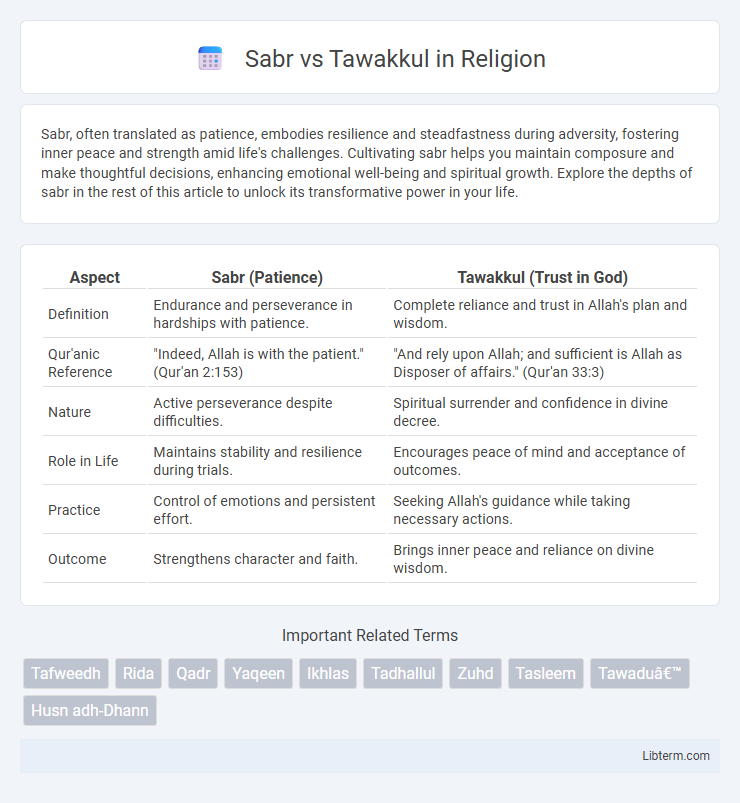Sabr, often translated as patience, embodies resilience and steadfastness during adversity, fostering inner peace and strength amid life's challenges. Cultivating sabr helps you maintain composure and make thoughtful decisions, enhancing emotional well-being and spiritual growth. Explore the depths of sabr in the rest of this article to unlock its transformative power in your life.
Table of Comparison
| Aspect | Sabr (Patience) | Tawakkul (Trust in God) |
|---|---|---|
| Definition | Endurance and perseverance in hardships with patience. | Complete reliance and trust in Allah's plan and wisdom. |
| Qur'anic Reference | "Indeed, Allah is with the patient." (Qur'an 2:153) | "And rely upon Allah; and sufficient is Allah as Disposer of affairs." (Qur'an 33:3) |
| Nature | Active perseverance despite difficulties. | Spiritual surrender and confidence in divine decree. |
| Role in Life | Maintains stability and resilience during trials. | Encourages peace of mind and acceptance of outcomes. |
| Practice | Control of emotions and persistent effort. | Seeking Allah's guidance while taking necessary actions. |
| Outcome | Strengthens character and faith. | Brings inner peace and reliance on divine wisdom. |
Understanding the Concepts: What are Sabr and Tawakkul?
Sabr refers to patience and perseverance during hardships, emphasizing endurance and self-control in the face of difficulties. Tawakkul means placing complete trust and reliance on Allah's plan while actively taking the necessary steps to overcome challenges. Both concepts complement each other in Islamic teachings, promoting resilience by balancing patience with proactive faith-driven action.
The Quranic Basis for Sabr and Tawakkul
The Quran emphasizes *Sabr* (patience) as a fundamental virtue, frequently commanding believers to remain steadfast in adversity, as stated in Surah Al-Baqarah (2:153), "O you who have believed, seek help through patience and prayer." *Tawakkul* (trust in Allah) is equally emphasized, with Surah Al-Imran (3:159) urging reliance on Allah after making efforts, "And rely upon Allah; and sufficient is Allah as Disposer of affairs." Together, these principles shape a balanced spiritual approach, where perseverance through trials is paired with deep reliance on Allah's wisdom and decree.
Key Differences Between Sabr and Tawakkul
Sabr refers to patient perseverance and endurance during trials, emphasizing active self-restraint and steadfastness in adversity. Tawakkul denotes trust and reliance on Allah's plan, involving surrendering the outcome of efforts to divine wisdom while maintaining sincere effort. The key difference lies in Sabr being the disciplined response to hardship, whereas Tawakkul is the spiritual reliance on God following that perseverance.
The Role of Faith in Practicing Sabr and Tawakkul
Faith plays a pivotal role in practicing Sabr (patience) and Tawakkul (trust in Allah), as it strengthens the believer's resilience during hardships and fosters unwavering reliance on divine wisdom. Sabr requires deep conviction that hardships serve a higher purpose, while Tawakkul involves sincere belief that Allah's support and guidance will prevail despite uncertain outcomes. Together, these concepts reinforce spiritual endurance by coupling patient endurance with confident submission to God's will.
Benefits of Sabr in Challenging Times
Sabr, or patience, cultivates resilience by enabling individuals to endure hardships with perseverance and unwavering faith, reducing stress and enhancing emotional stability. Practicing Sabr in challenging times strengthens mental fortitude, encourages reflective thinking, and fosters a deeper spiritual connection, which aids in overcoming adversity. This approach contrasts with Tawakkul, or reliance on God, by emphasizing active endurance and personal effort alongside trust in divine wisdom.
The Power of Tawakkul: Trusting Divine Decree
Tawakkul embodies complete trust in divine decree, empowering believers to surrender outcomes to Allah's will while maintaining sincere effort. This deep reliance on God's wisdom cultivates inner peace and resilience, surpassing mere patience (Sabr) during trials. Embracing Tawakkul strengthens faith by acknowledging that ultimate success comes from Allah's precise plan and timing.
Practical Strategies to Cultivate Sabr
Cultivating sabr involves intentional mindfulness practices such as consistent prayer, deep breathing, and reframing challenges as opportunities for growth. Incorporating gratitude journaling helps strengthen patience by shifting focus from adversity to blessings, while setting realistic goals fosters perseverance amid trials. Regular reflection on Quranic verses about sabr enhances spiritual resilience and reinforces the connection between patience and trust in Allah's plan.
How to Strengthen Tawakkul in Daily Life
Strengthening Tawakkul in daily life involves consistently trusting Allah's plan while actively making efforts toward goals, such as setting clear intentions and practicing mindfulness in decision-making. Cultivating gratitude and regular prayer reinforces reliance on divine wisdom, balancing trust with personal responsibility. Reflecting on past experiences of Allah's support enhances confidence in His guidance, fostering deeper spiritual resilience and patience.
Real-Life Examples of Sabr and Tawakkul
Sabr, often exemplified by a student persistently studying despite repeated exam failures, reflects steadfast patience and perseverance in adversity. Tawakkul manifests in a farmer who diligently cultivates crops while trusting in Allah's provision and outcomes beyond human control. These real-life examples demonstrate the balance between human effort and reliance on divine wisdom in Islamic practice.
Integrating Sabr and Tawakkul for Spiritual Growth
Integrating sabr (patience) and tawakkul (trust in God) strengthens spiritual growth by balancing endurance during trials with deep reliance on divine wisdom. Sabr cultivates resilience and self-control in the face of hardships, while tawakkul promotes surrender and confidence in God's plan, fostering inner peace. Together, these principles create a harmonious path toward spiritual maturity and steadfast faith.
Sabr Infographic

 libterm.com
libterm.com